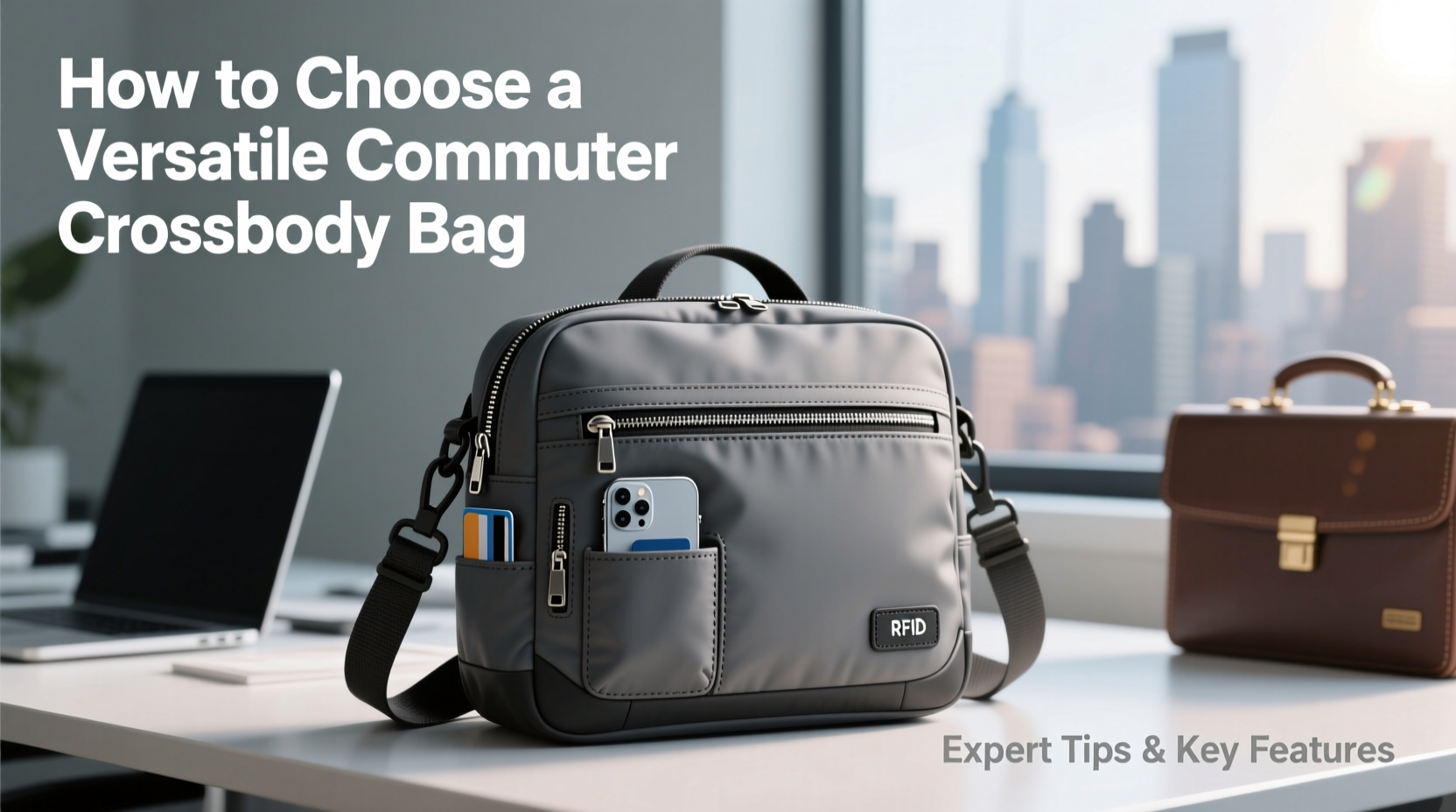Navigating city streets, hopping on public transit, or biking to work demands more than just stamina—it requires smart gear. Among the most essential accessories for modern urban professionals is the crossbody bag. Unlike bulky backpacks or delicate clutches, a well-chosen crossbody strikes the perfect balance between security, comfort, and style. But not all crossbody bags are built for daily commuting. The right one must endure wear, protect your essentials, and adapt to changing environments—from coffee shops to coworking spaces. Understanding what makes a crossbody truly versatile can save you time, money, and discomfort in the long run.
Why a Commuter Crossbody Bag Matters

The daily commute often involves unpredictable conditions: rain, crowded subways, sudden errands, or last-minute meetings. A reliable crossbody bag keeps your phone, wallet, keys, laptop, and other essentials secure while allowing hands-free mobility. Its diagonal strap design distributes weight across the torso, reducing shoulder strain compared to single-strap totes. More importantly, wearing it across the body deters pickpockets—especially in high-traffic areas.
But functionality isn’t just about safety. Versatility means transitioning seamlessly from work to weekend, office to evening out. A good commuter crossbody should look professional enough for client meetings yet casual enough for weekend brunches. It should also accommodate tech gear without appearing like a mobile command center.
Key Features of a Versatile Commuter Crossbody
Selecting the right crossbody bag goes beyond aesthetics. Prioritize these functional attributes to ensure lasting performance and adaptability.
Durable, Weather-Resistant Materials
Urban environments expose bags to moisture, dust, and abrasion. Opt for water-resistant fabrics like ballistic nylon, waxed canvas, or treated leather. These materials withstand light rain and resist scuffing from daily contact with chairs, doors, and railings. Avoid unlined cotton or thin synthetics that fray easily.
Ergonomic Design and Adjustable Strap
The strap should be wide enough (at least 1.5 inches) to prevent digging into your shoulder. Look for padding or mesh backing for added comfort during extended wear. An adjustable strap lets you customize fit based on clothing layers or carrying preferences—shorter for security, longer for ease of access.
Smart Organization
A cluttered bag leads to wasted time and frustration. Choose models with dedicated compartments: a padded sleeve for tablets or small laptops (up to 10”), zippered interior pockets for cards and cash, and quick-access slots for phones and transit passes. Magnetic or flap closures offer faster entry than full zippers but should still provide adequate security.
Anti-Theft Elements
Hidden RFID-blocking pockets protect credit cards and passports from digital theft. Lockable zippers, slash-resistant straps, and discreet entry points (like back-panel access) add extra layers of protection. While not foolproof, these features significantly reduce risk in transit zones.
Appropriate Size and Weight
Aim for a bag that holds essentials without encouraging overpacking. Dimensions around 10” x 7” x 3” typically suffice for wallets, phones, chargers, sunglasses, and a compact umbrella. The empty bag should weigh under 1.5 pounds to avoid adding unnecessary load.
“Commuter bags succeed when they disappear into your routine. You shouldn’t have to adjust them every few blocks.” — Lena Torres, Urban Lifestyle Designer at TransitForm Goods
Step-by-Step Guide to Choosing Your Ideal Crossbody
Follow this process to make an informed decision tailored to your lifestyle:
- Assess Your Daily Carry: List everything you bring daily—phone, wallet, earbuds, keys, notebook, etc. Measure their combined volume to estimate needed capacity.
- Test Real-World Scenarios: Simulate your commute. Can you access your transit card quickly? Does the bag bounce while walking?
- Evaluate Access Points: Open the main compartment mid-stride. Is it easy to reach items without removing the bag?
- Check Tech Compatibility: If carrying a tablet or power bank, verify internal dimensions and padding.
- Wear It for a Trial Run: Spend a full day using the bag before committing. Note pressure points, zipper usability, and overall confidence in its security.
Do’s and Don’ts When Selecting a Commuter Crossbody
| Do’s | Don’ts |
|---|---|
| Choose bags with reinforced stitching at stress points (straps, corners) | Don’t prioritize fashion over function—ornate hardware can snag or break |
| Opt for neutral colors (black, navy, olive) for maximum versatility | Avoid overly shiny materials that show scratches easily |
| Pick odor-resistant linings to prevent mildew in damp climates | Don’t ignore closure type—zippers offer better security than snap flaps alone |
| Look for brands offering repair services or warranties | Don’t buy oversized bags “just in case”—they defeat the purpose of minimalism |
Real Example: How Sarah Upgraded Her Commute
Sarah, a graphic designer in Chicago, used to carry a stylish but flimsy leather crossbody. After two months, the strap detached during rush hour, spilling her belongings onto a wet sidewalk. Her phone was damaged, and she missed a client call. She switched to a waxed canvas model with an internal laptop sleeve, RFID pocket, and adjustable air-mesh strap. Now, she confidently walks 20 minutes to the L train each morning, accessing her transit pass through a side slot without opening the bag. Rain no longer worries her, and the structured shape maintains its form even when fully loaded.
“It’s not just about looking put together,” she says. “It’s about feeling prepared. I don’t stress about my stuff anymore.”
Expert Tips for Long-Term Use and Care
Your crossbody will face daily friction, moisture, and handling. Extend its life with proactive care:
- Clean the exterior monthly with a damp cloth and appropriate cleaner (leather conditioner for genuine leather, mild soap for synthetics).
- Empty and air out the bag weekly to prevent odor buildup.
- Store it stuffed with tissue paper when not in use to maintain shape.
- Rotate between two commuter bags if possible—this reduces wear and gives each time to recover form.
“Materials matter, but usage habits define longevity. A $300 bag abused daily won’t last as long as a $150 one treated with care.” — Marcus Lin, Product Durability Analyst at Urban Gear Review
Frequently Asked Questions
Can a crossbody bag fit a laptop?
Yes, many modern crossbody bags include padded sleeves for devices up to 10.5 inches. For larger laptops (13”+), consider a slightly bigger format or a convertible sling-style crossbody designed for tech commuters.
Is leather suitable for year-round commuting?
Full-grain leather is durable and ages well, but it absorbs moisture. If you live in a rainy or snowy climate, opt for sealed or waxed leather, or choose synthetic alternatives like Cordura nylon for better weather resistance.
How do I prevent shoulder strain?
Ensure the strap is wide and adjustable. Wear the bag across your chest rather than off one shoulder. Take breaks during long walks by switching sides or briefly removing the bag. Consider models with sternum stabilizers for active commutes.
Final Checklist Before You Buy
- ✅ Fits your essential items without bulging
- ✅ Made from durable, weather-resistant material
- ✅ Has secure, accessible compartments
- ✅ Features an adjustable, comfortable strap
- ✅ Includes anti-theft elements (RFID, lockable zippers)
- ✅ Weighs less than 1.5 lbs when empty
- ✅ Matches both work and casual outfits
- ✅ Comes with warranty or repair options
Make Your Commute Smarter Today
Choosing the right commuter crossbody bag isn’t about chasing trends—it’s about investing in a tool that supports your daily rhythm. With thoughtful selection, proper maintenance, and realistic expectations, your bag can become a trusted companion for years. Whether you’re dashing between meetings, riding a bike through downtown, or traveling for work, the right crossbody simplifies your life. Don’t settle for compromise between style and function. Evaluate your needs, test your options, and upgrade to a bag that works as hard as you do.









 浙公网安备
33010002000092号
浙公网安备
33010002000092号 浙B2-20120091-4
浙B2-20120091-4
Comments
No comments yet. Why don't you start the discussion?